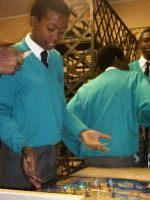
2003 & 2004 Champion


The school itself, however, is something of an oasis, born out of the educational boycotts of the 1980s, and is one of the few schools founded in the inner-city when education collapsed in the townships, to have survived into the Liberation era. Originally called the Freedom Centre, the name was changed to deflect unwarranted attention from the Security Forces. It is something of a flagship of inner-city schooling, boasting an excellent pass rate, and secure finances thanks to excellent management and a Trust Fund that has allowed computer labs to be built and extra staff to be hired.
The school has few sporting facilities apart from a modest swimming pool, and a volleyball and basketball court which doubles as a car-park. With little physical space, the school has actively tried to promote mind sports, and the Wargames Club has an active presence. Draughts, morabaraba, figure-gaming and Diplomacy are all actively played.

|
|
Dominic Aphane 2003 & 2004 Champion |
One spectator was Edi Birsan who was visiting South Africa at the time. Edi's generous donation of several diplomacy sets was to enable the club to play more than one game at a time!

|
|
Musa Mnisi 2005 Champion |
Looking back on this year’s tournament, I am left with a few impressions. First of all, one can begin to speak, I think, of the emergence of a township, or is it a schoolboy style of play. Players delight in boasting. Most negotiation takes place at the table, giving a Wilsonian feel to the game. Although secret negotiations are not unknown, they are not the norm, and it is certainly permissible to laugh openly at an opponent’s difficulties, or to boo his misorders. Players who are late in getting orders in are particularly apt to be chided. In short there is very little that is Diplomatic in the way these youngsters play the game, but their enthusiasm is greatly encouraging. Scarcely has the bell rung for lunch-break when the sound of running feet can be heard outside my classroom. The board is taken down from my shelf and the pieces set up almost before I can pause to draw breathe. Negotiations begin immediately, as well as loud comments about who the latest victim of a stab is likely to be.
Three of the youngsters in this tournament played in the World Masters tournament this year as part of the Diplomatic Corpse Team. Of the three, Dominic Aphane, Musa Mnisi and Pumla Mpili, only young Musa was not eliminated in his game. None of the three were particularly communicative, finding the e-mail format as well as the e-mails they received a bit intimidating. All three tended to play gunboat style. By contrast, in their own environment, all were formidable negotiators.
All in all, I believe this tournament to be somewhat unique, both in its format, successive games played over a lunch-break, and in its intent to blood young players at school level and draw them into wider competitive play within the SAWU structure of tournaments.
 |
Dorian Love ([email protected]) |
If you wish to e-mail feedback on this article to the author, and clicking on
the mail address above does not work for you, feel free to use the "Dear DP..." mail interface.

